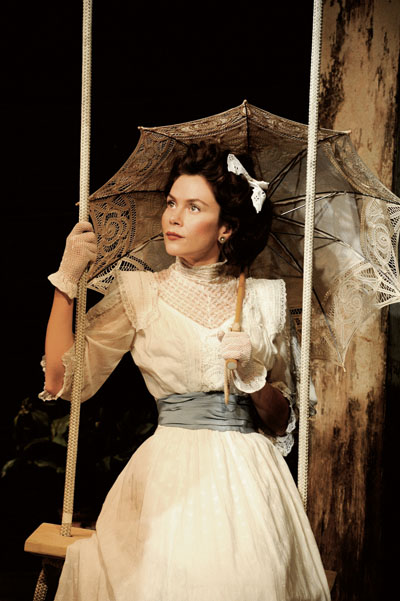Uncle Vanya comes into the Vaudeville at an artful slouch. Lindsay Posner’s take on Chekhov’s story of bickering Russian sophisticates has an unusual visual style. In Britain we’re used to seeing Chekhov set in some fading Palladian mansion just outside Haslemere or Bath. Designer Christopher Oram has rummaged through the archives and discovered some hideously authentic stylings. He offers us a gloomy Siberian dacha, all cobwebby nooks and stacked timbers painted cowpat brown and carved with ornamental Asiatic doodles. This hulking coffin of a house emphasises the isolation and pinched misery of the play.
The starry cast shine with fitful brilliance. Dr Astrov is played by Sam West, a good-looking blank, whose acting style hovers between heavily sedated and full-on Lazarus. But he’s on sprightly form here and he captures the romance, the quirkiness and the sexual opportunism of the cranky doctor superbly. (Memo to make-up team: Astrov twice mentions his big silly moustache so give him a big silly moustache, not a neatly tonsured goatee.)
Anna Friel, gorgeous in her white frock and piles of lustrous chestnut hair, is a sumptuously superficial Yelena. And, like the best Yelenas, she makes us wonder why any performer would choose to play this boring, manipulative, self-pitying and pointlessly over-educated numbskull. There’s a great cameo from Mark Hadfield, as Telyegin, the lovable cuckold, who fidgets and quivers wonderfully at the margins of the action.
Bustling, rosy-cheeked Ken Stott takes on the title role. With the face of a debauched butcher, and with a Pickwickian beergut straining the buttons of his waistcoat, he looks more like a caricature from late-Regency London than an elegantly wasted intellectual from Edwardian Russia.
Nature has handed Stott a weird inventory of gifts: a clown’s expression, a growling, scabrous voice, and a lot of forthright, angry mannerisms. His gasping diction resembles Prezza doing an impersonation of Rumpole or Captain Mainwaring. And, to be blunt, he’s a bit out of condition to play the 53-year-old Vanya who still fancies himself as a ladies’ man. When Stott made a sexless grab for Friel it all looked a bit Jim’ll Fix It.
The show’s worst gaffe is the casting of Sonya. This sweet-natured drudge needs to be played by someone ugly or ‘plain’ as she calls herself. It does no harm if she’s also plump, round-shouldered, pimply and pushing 50. Laura Carmichael is a slim, peachy-skinned blonde, and her youthful beauty makes nonsense of her crushed hopes for Astrov. And when he rejects her, he comes across as either mad, autistic, or latently homosexual. These are not the notes Chekhov was aiming for.
This Vanya captures much of the play’s essence: the emotional hollowness, the flat-lining tedium and the mood of morose self-flagellation. But it’s very short of mirth or cordiality. Then, again, the box-office is doing a storming trade.
Horrible Histories is suffering from arthritis. Terry Deary’s gloriously silly books have spawned a zippy and irreverent TV show. This has morphed into a successful international playlet which nips about all over the shop. Last month it returned from the Gulf. Touring a show can be cripplingly expensive if every venue has to be inspected and altered in advance by designers. So Horrible Histories travels light. With a cast of two, this portable version can be performed in virtually any arena: a lecture hall, an art gallery, a gym, a prison, a harem, an ambassador’s court, or even on the lawn of some Red Sea dictator’s ornamental garden.
The props and paraphernalia are carried on stage by the performers. Costume changes are done behind the cover of a big dressing-up box. But this flexibility comes at a price. The show looks flimsy and insubstantial. The clothes, wigs and hats could do with a long weekend at the repair shop. Ditto the well-thumbed actors. Spirited as they are, they seem fuddled with jet lag, as if fuelled by the afterburn of last week’s adrenalin. And they can’t quite dispel the stale air of department-store Santas that clings to them. Play-goers expecting the spirited jollity of the TV version will be disappointed. This is the echo of a great show. And it’s brief too. It offers parents barely an hour’s respite from the West End and the Christmas scrummages.
I went with my six-year-old boy and he found it entertaining but not gobsmackingly memorable. He couldn’t understand why it finished after just 60 minutes. And he missed the sprawling many-layered zaniness of the TV show he loves. Back at home, he was asked how it went. ‘Bad,’ he told his mum. ‘There were only two people practising.’







Comments